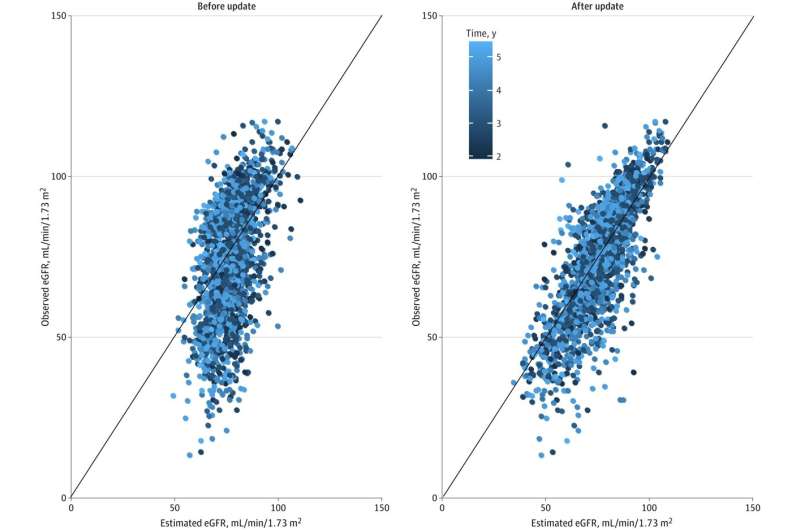This article has been reviewed according to Science X's editorial process and policies. Editors have highlighted the following attributes while ensuring the content's credibility:
fact-checked
peer-reviewed publication
trusted source
proofread
Predictive model developed for complications in diabetes

Approximately 40% of persons with diabetes develop chronic kidney disease, leading to successive deterioration and even the complete loss of kidney function. Until now, it has not been possible to predict whether and at what rate the kidney disease will progress. Early detection is essential to delay or avoid kidney failure requiring dialysis.
As part of an international research project led by MedUni Vienna, a tool was developed that allows estimates up to five years in advance, thus allowing for timely preventive measures. The results of the study were recently published in the journal JAMA Network Open.
For their research, the team led by Rainer Oberbauer, Head of the Division of Nephrology and Dialysis at MedUni Vienna's Department of Medicine III, and Mariella Gregorich from MedUni Vienna's Center for Medical Data Science drew on data from major international studies. This made it possible to include 13 routinely-collected baseline values from 4,637 18- to 75-year-olds with type 2 diabetes with slightly to moderately impaired kidney function.
In addition to the most important value for assessing kidney function (estimated glomerular filtration rate, eGFR), age, gender, body mass index, smoking behavior, hemoglobin and cholesterol levels as well as medication intake were selected as predictors. On this basis, the research team developed a predictive model based on tested statistical methods, which is already being prepared for clinical use.
"The strength of our study compared to previous research on the topic lies not only in the refined methodology, but also in the large amount of data. This allows us to attain a high level of confidence in our findings," says first author Mariella Gregorich. "Accordingly, the prediction tool proves to be reliable and able to predict a decline in kidney function based on eGFR for up to five years after baseline."
However, the study has also revealed that the individual course depends on other, still unknown factors.
Early recognition and therapy management
Chronic kidney disease (CKD) is one of the most common complications of diabetes and the most common cause of kidney failure that requires dialysis. Since CKD does not have any symptoms in the early stages, it is often recognized only when the decline in kidney function is already very advanced. Through early detection and consistent therapy management, especially in diabetic metabolic and blood pressure control, kidney damage can be delayed or prevented.
Currently, kidney function in persons with diabetes is mainly monitored by the regular measurement of eGFR.
"Our prediction tool can assist in the continuous monitoring of disease progression and allow the identification of patients with an increased risk of worsening kidney function in the coming years," says study leader Rainer Oberbauer, highlighting the significant clinical relevance of the prediction tool. A web-adapted version of the model is already under construction and will soon be available for further, independent validation at https://beatdkd.shinyapps.io/shiny/.
More information: Mariella Gregorich et al, Development and Validation of a Prediction Model for Future Estimated Glomerular Filtration Rate in People With Type 2 Diabetes and Chronic Kidney Disease, JAMA Network Open (2023). DOI: 10.1001/jamanetworkopen.2023.1870



















